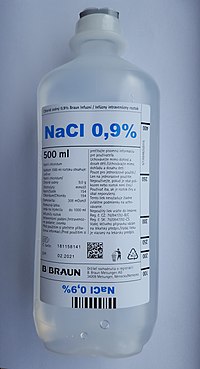
Photo from wikipedia
The discovery and validation of biomarkers resulting from technological advances in the analysis of genomic, transcriptomic, lipidomic and metabolomic pathways involved in the pathogenesis of complex human diseases have led… Click to show full abstract
The discovery and validation of biomarkers resulting from technological advances in the analysis of genomic, transcriptomic, lipidomic and metabolomic pathways involved in the pathogenesis of complex human diseases have led to the development of personalized and rationally designed approaches for the clinical management of such disorders. Although some of these approaches have been applied to systemic sclerosis (SSc), an unmet need remains for validated, non-invasive biomarkers to aid in the diagnosis of SSc, as well as in the assessment of disease progression and response to therapeutic interventions. Advances in global transcriptomic technology over the past 15 years have enabled the assessment of microRNAs that circulate in the blood of patients and the analysis of the macromolecular content of a diverse group of lipid bilayer membrane-enclosed extracellular vesicles, such as exosomes and other microvesicles, which are released by all cells into the extracellular space and circulation. Such advances have provided new opportunities for the discovery of biomarkers in SSc that could potentially be used to improve the design and evaluation of clinical trials and that will undoubtedly enable the development of personalized and individualized medicine for patients with SSc.Biomarkers are urgently needed to improve diagnosis and patient care in systemic sclerosis (SSc). Jimenez and colleagues discuss the current state of biomarkers for SSc and provide an update on how new biomarkers could make personalized medicine a reality.Key pointsAn urgent unmet need exists for validated non-invasive biomarkers for the diagnosis, assessment of disease activity and response to therapy of patients with systemic sclerosis (SSc).Biomarkers can be used as easily measurable surrogate markers for clinical end points to aid in the stratification of patients for clinical trials.Current biomarkers for SSc include cutaneous induration and assessment of serum autoantibodies and nailfold capillaroscopic patterns, although only cutaneous induration has been validated for diagnosis, prognosis or response to treatment.Extracellular vesicles (EVs) contain a large number of macromolecules that reflect the physiological or pathological state of the cells of origin, rendering them a novel and valuable source of biomarkers.Transcriptomic and proteomic analyses of EVs isolated from patients with SSc could provide biomarkers for diagnosis, classification and assessment of disease activity, prognosis and therapeutic response.Novel biomarkers will be of value in the provision of precision and personalized medical care to patients with SSc.
Journal Title: Nature Reviews Rheumatology
Year Published: 2018
Link to full text (if available)
Share on Social Media: Sign Up to like & get
recommendations!